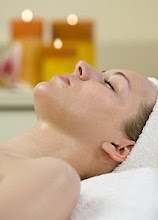Virtually everyone has noticed the remarkable difference a good night's sleep can make to the skin. But
what exactly happens to the skin and the rest of the body during those hours of shut-eye?
During sleep, the body regenerates itself according to a complex schedule. Soon after we fall asleep, certain processes take place that are quite different from those that happen after a few hours of sleep. (This is why waking up in the middle of the night and not being able to fall back to sleep is so disruptive to the following day's schedule. Our bodies have undergone only part of the renewal necessary for proper function the following day.)
Among these processes is the renewal of the immune system—so important at this time of year when children are back at school and "winter ills" begin to spread. It's no myth that one of the best things you can do if you feel a cold coming on is to go to bed early. During sleep, the immune system restores itself and gathers together its cold-and flu busting powers.
During the six phases of sleep, the body undergoes a vast number of functions. During the third and fourth phase of deep sleep (each lasting on average 100 minutes), growth hormones are secreted. These hormones help repair and rebuild the tissues of the body, including the skin. During this deep sleep, or delta sleep, the body's cells increase production, and reduce breakdown, of proteins. This includes the skin's supportive structures, collagen and elastin. Any damage that the skin has incurred, such as that caused by ultraviolet light, is repaired during this phase of sleep. The skin's antioxidant activity also increases, reducing damage from free radicals.
One or two nights of disrupted sleep won't affect your body in the long term. However, missing out on one or two hours sleep nightly will age the skin more rapidly and gradually wear down the immune system. Chronic lack of sleep also increases the production of the stress hormone, cortisol, which further reduces the body's ability to regenerate and restore itself. If you're having difficulty sleeping, which happens to us all from time to time, you might want to check with a health professional to determine of a melatonin supplement might help you. Melatonin helps set your sleeping clock, which is why it can be so helpful if you have jet lag.
And how long should you sleep? When in good health, the experts say between seven and nine hours, with eight hours being the ideal. More than nine hours—unless you are sick—appears to stress the body.
 Back to your skin: Since most of its repair processes take place during sleep, it makes sense to feed your skin during this time. Spa Utopia carries a number of professional quality night creams, such as Comfort Zone Renight Recover that will provide your skin with supportive ingredients. (And now, you can purchase these from our online store—at any time of the day or night...)
Back to your skin: Since most of its repair processes take place during sleep, it makes sense to feed your skin during this time. Spa Utopia carries a number of professional quality night creams, such as Comfort Zone Renight Recover that will provide your skin with supportive ingredients. (And now, you can purchase these from our online store—at any time of the day or night...)For more information on what skincare formulations will best help your skin's night time repair process, please talk to your Spa Utopia technician.













No comments:
Post a Comment